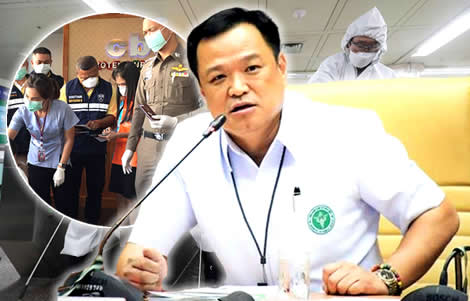BANGKOK: There is no time to lose as migrant Thai workers from South Korea pack their bags and begin returning home through Thai airports. The infection risk from this group is far higher and the situation requires urgent regulation by Thai authorities in their efforts to contain the virus.
Thailand is preparing to introduce new regulations specifying eleven high-risk zones including nine countries and two territories which will be subject to new controls to be rigorously applied to passengers from these places including quarantine periods. The move was announced on Tuesday by the Minister of Public Health Anutin Charnvirakul and is similar to provisions used by the United States to protect its nationals against the virus.

A message posted by the Public Health Minister on Tuesday afternoon on Facebook suggests that the Thai government has designated 9 countries and two territories as high-risk zones in response to the heightened threat posed by the coronavirus as it spreads its tentacles around the world.
The nine countries are China, Germany, Iran, Italy, South Korea, Taiwan, France, Japan and Singapore and the two territories are Hong Kong and Macau.
Post showing the signed order published on Facebook but disappeared shortly afterwards
The announcement by Anutin Charnvirakul showed an official order signed by him and specifying that all passengers from these locations must self-quarantine for a minimum period of 14 days.
It was reported that an updated schedule of control provisions will be published in due course by the government. The new regime will become effective when published as law via Thailand’s Royal Gazette.
China, Italy, Iran and South Korea are on the list of high-risk zones as well as France and Germany
The nine countries are Japan, Germany, South Korea, China, Taiwan, France, Singapore, Italy and Iran. The two territories are Hong Kong and Macau. According to the announcement, these new provisions will come into effect once they are published in the Royal Gazette.
On Tuesday afternoon, there was some confusion about the announcement when the post by the minister, who is at the centre of the fight against the outbreak, was subsequently deleted.
Urgency linked to returnees from South Korea
The urgency of the situation has come to light in the last few days with returning migrants and illegal workers from South Korea where the severe outbreak in Daegu, the city at the centre of the outbreak there in North Gyeongsang Province has forced many Thai nationals to return home.
That city is home to many casual or illegal Thai workers as well as a smaller number of fully documented emigrants from the kingdom.
Thai migrants workers in South Korea pose a high risk and must be monitored on return to Thailand
The scale of the outbreak there means that Thai workers from the area pose a higher risk of infection.
This week, Thai ministers revealed that there are no existing laws or regulations to force those returning into quarantine for the required period.
Authorities believe that there may be up to 100 Thai workers returning home from South Korea even now on a daily basis with checks showing 70 coming through Suvarnabhumi Airport and 20 through Don Muang in recent days.
Reports suggest 5,000 getting ready to return
Intelligence suggests that there may be up to 5,000 Thai workers planning an imminent return to the kingdom.
It is being reported that since the beginning of the year, 4,000 Thai workers have returned from South Korea but this number is set to escalate with tighter immigration controls in the East Asian country in response to a growing emergency there.
Deputy PM Prawit Wongsuwan: no law to force citizens into quarantine exists at this point
On Tuesday, Deputy Prime Minister Prawit Wongsuwan is reported as saying that no law exists that could force these Thai citizens into quarantine even less, any way to ensure that they comply with such instructions from authorities.
The 138 Thai nationals evacuated from Wuhan in China early last month were all quarantined at the Thai naval base in Sattahip and it is reported that at least one tested positive for the coronavirus and was treated.
Earlier, the Public Health Ministry had indicated the priority attached to screening and treating those returning from South Korea when it said that volunteers were in place to test and monitor all the returnees for the critical period required.
Further reading:
Investigation into the death of a 35-year-old man from the virus as foreign passengers detained
Ministry officials scramble to undo the damage of potential virus super spreader who lied to doctors
Tourism minister predicts higher temperatures will help to bring an end to the coronavirus threat


















